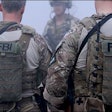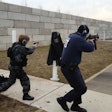Law Enforcement Memorial Week just ended. So I wanted to take a few moments to reflect on this time of remembrance for our fallen brothers and sisters and what it really means to us.
As law enforcement officers, we have undertaken a never-ending quest to combat criminals who relentlessly prey on society. And with this comes the risks of bodily harm and even death that all officers understand and accept as part of doing the job.
I can tell you from personal experience that this realization takes on added, special meaning during Law Enforcement Memorial Week. Many of you attended memorial ceremonies last week either in Washington, D.C., or your home city or state.
So I don’t have to tell you that these ceremonies are deeply affecting as you stand with fellow officers and contemplate the somber reality of those who so courageously sacrificed their lives to protect society. It’s a truly humbling experience.
It’s also an experience that stirs a great passion in many officers. It’s something we don’t talk about, but separately and together, we experience it almost universally. Meditating on the sacrifice of our fallen, we resolve to do whatever it takes to prevent ourselves and fellow officers from becoming casualties.
This resolve to survive and prevail is silently present throughout every Police Week memorial ceremony and every funeral of an officer killed in the line of duty. Something else also occurs after every memorial service and funeral. And that is we go home and give our families extra hugs, which serves to reinforce our survival resolve even further.
The resolve to survive and prevail must be our mission throughout our entire careers. As soon as we let our guard down, we hand the advantage to our adversaries. Through training, skills and tactics, we strive to improve our survival odds to our favor.
This is why we’re always serious in training, with our heads screwed on straight. We know that mistakes are to be made, and it’s best to make them during training where we can learn from and not on the street.
As always happens after memorial services, time continues its relentless march. In time, the searing pain that accompanies police memorials and funerals begins to dull. And all too often, the fierce determination not to let our guard down begins to return to the familiarity of “routine.”
This is the difficult part, challenging ourselves to always be on the alert and preparing ourselves as best we can for every eventuality, predictable and unpredictable. Anyone who works the street understands and lives this, or should. It’s what improves the odds of us going home at the end of our shifts and making it to retirement intact.
This reality applies equally to all who work the streets, patrol and SWAT alike. SWAT has an additional responsibility, one we readily volunteer for. A responsibility that comes with the saying: “When citizens are in trouble, they call the police. When police are in trouble, they call SWAT.” Which means we have to be ready for everything and anything. Because “Who do SWAT officers call when they are in trouble?”
With Law Enforcement Memorial Week 2008 behind us, now is the time for all of us to reinforce our resolve to always do our best to be ready, willing, and able for whatever we face in the future.
Heed the following wise words from a departed SWAT brother, Terry Thorpe (Ashtabula County (Ohio) SWAT): “When you aren’t practicing, somewhere, someone is, and when you meet him, he will win.”
These words are doubly true for all SWAT teams. If we’re not taking advantage of every training opportunity, we are setting ourselves up for potential failure. And failure means disaster and death in real-world missions.
Of course training hard when you’re tired and hungry or the weather is lousy or when other things are weighing on your mind and distracting you is easier said than done. But remember on those bad days that honing skills and tactics through training is what will get you safely through difficult SWAT operations. Anything less than total dedication to the mission will result in failure. And we know that failure is not an option for any police officers, especially not for those in SWAT.












